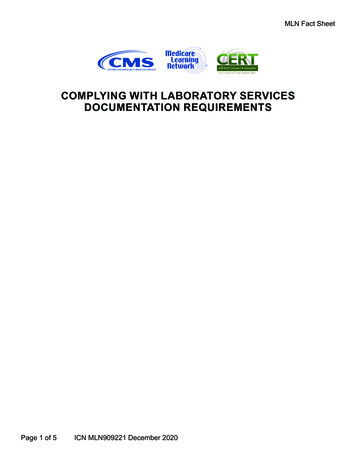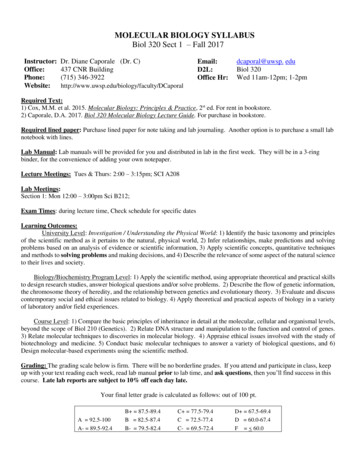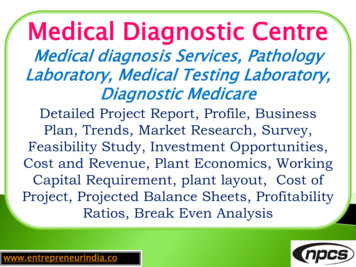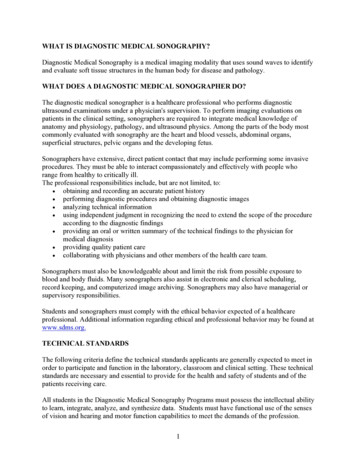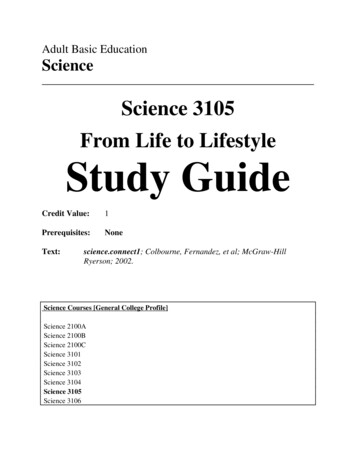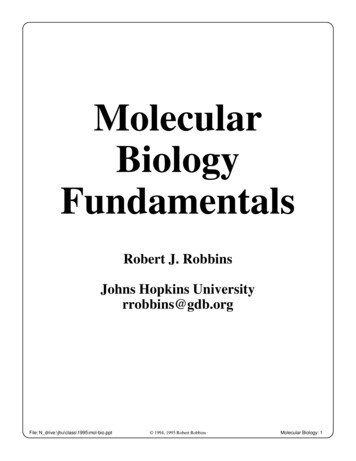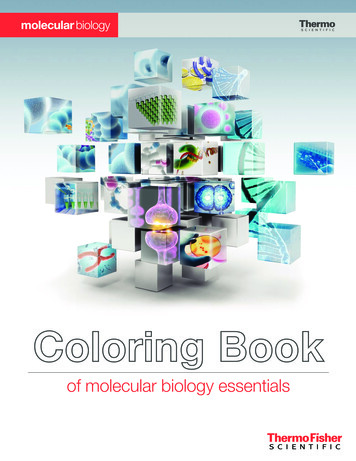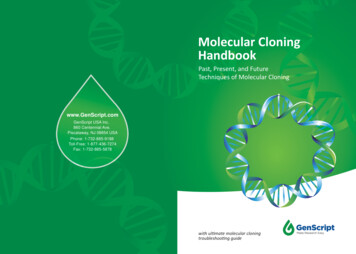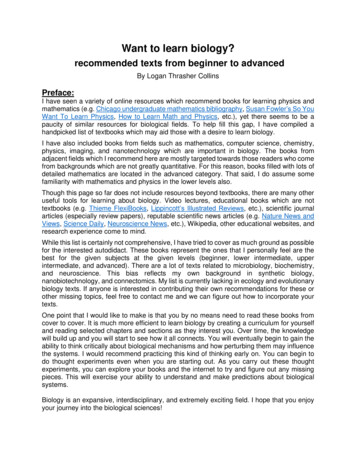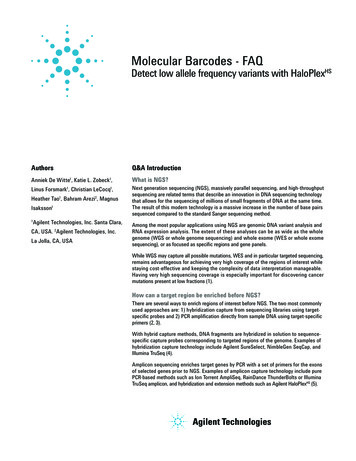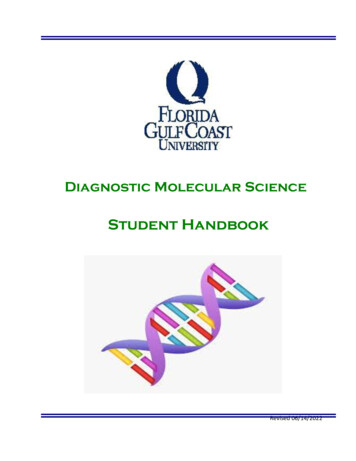
Transcription
Diagnostic Molecular ScienceStudent HandbookRevised 06/14/2022
1PLANTING A GARDEN OF PRIDEFirst, plant five rows of peas.Preparation, Patience, Presence,Promptness, and PerseveranceThen, plant three rows of squash.Squash gossip, Squash interference,Squash indifference, Squash unjustcriticism.Add five rows of lettuces.Let us be faithful to duty, Let us beunselfish and loyal, Let us be true toour obligations, Let us obey rules andregulations, and let us be kind to oneanother.And since no garden is completewithout them, finally plant turnips.Turn up with a winning attitude, Turn upwith a smile, Turn up with new ideas,Turn up with determination to makeeverything count for something.Revised 06/14/2022
2Table of ContentsWelcome . .3Faculty & Staff Directory . .3DMS Mission Statement .4DMS Program Goals . .4Faculty Commitment . .6Student Responsibilities .6Graduate Goals & Objectives .7Student Learning Outcomes . .8Current Clinical Affiliates . .10Community Advisory Council.10Standards of Performance .11Immunization Records . .11Student Criminal Background Checks . . 11Student Illness & Absences .12Student Leave . .12Academic Standards .1 2Professional Standards . .14Standards of Behavior In The Classroom .14Academic & Non-Academic Concerns .14Essential Requirements .15Student Resources. .15Academic & Personal Counseling .17Library.17Program Evaluation .17DMS Laboratory Safety Rules .18Off-Campus Policies. .19Professional Attire .19Transportation & Living Accommodations.19Student Employment .19Patient/Client/Site Confidentiality.19Professional Liability Insurance . .20Scheduling & Holidays .20Trainee Registration .20Student Accident Or Event . .21Certification and Licensure. .22American Society for Clinical Laboratory Science Code of Ethics. .23Student Information Form . .25Program Offerings .26Post-Baccalaureate Molecular Diagnostics Certificate .26Common Prerequisites . .26Required Courses .27Revised 06/14/2022
3This handbook is intended to serve you as a complete and conciseinformation source about Florida Gulf Coast University’s Diagnostic Molecular Science Program.Please take time to read it. If there are any concerns or questions, do not hesitate to contact the FGCUfaculty. Our goal is to provide you with the best possible education. We will work toward that goalduring your educational experience with us. You have been identified and selected to participate in ourprogram because we believe you have the aptitude, commitment, and the desire to become aprofessional. Congratulations! And best wishes for continued success.FACULTY AND STAFF DIRECTORYROOM #TELEPHONEE-Mail AddressJulie Zemplinski, MSH, MSProgram Director, Instructor IIIMarieb – 404590-7453jzemplinski@fgcu.eduShawn Felton, Ed.D.DeanPamela St. Laurent, Ed.D.Instructor IIMarieb – 438590-7074sfelton@fgcu.eduMarieb - 408590-7452pstlaure@fgcu.eduRevised 06/14/2022
4DMS PROGRAM MISSION STATEMENTThe mission of the Diagnostic Molecular Science Program is to improve the health ofsociety by educating and preparing competent, resourceful, and adaptable individualswith the knowledge, skills and attitudes that are required to fulfill current and futureprofessional roles and leadership positions as members of the health care team.DMS PROGRAM GOALSThe DMS Program will achieve the following goals to meet current and future needs:1. Graduate well-educated, technically competent practitioners who are able tointerpret, assess validity, and correlate clinical laboratory data.2. Prepare graduates to pass national certification examinations in order to enterprofessional practice.3. Instill the highest standards of performance and professional ethics in all graduates.4. Provide graduates with the tools that promote independent judgment and successfulproblem solving skills.5. Graduate professionals who effectively communicate with all members of thehealthcare team.6. Maintain accreditation for the DMS Program by the National Accrediting Agency forClinical Laboratory Science.7. Maintain approval for the DMS Program by the State of Florida Department of Health,Board of Clinical Laboratory Personnel program.8. Recruit an academically strong and diverse pool of students.9. Continue development of distance learning course components to augment thecurriculum and the program.10.Participate in community outreach activities with faculty and students.11.Continue assessment of the program to meet the changing needs of the SouthwestFlorida laboratory community.The DMS Program will meet the following unique DMS goals: Prepare graduates to provide service and research in the molecular diagnosis of acquired,inherited, and infectious diseases.Provide students with experiences in the areas of analysis, clinical decision-making,information management, regulatory compliance, education, and qualityassurance/performance improvement.Revised 06/14/2022
5 Graduate technically competent practitioners who can perform, develop, evaluate,correlate, and assure accuracy and validity of molecular laboratory testing andprocedures, and collaborate in the diagnosis and treatment of patients.Provide students with the skills for financial, operations, marketing, and human resourcemanagement of the molecular pathology laboratory.The DMS Program graduate will meet the following unique DMS competencies: Evaluate and monitor methods of collection, transport, and handling of various specimentypes for molecular analysis; Apply appropriate advanced principles and techniques to prepare specimens for molecularbased testing, as well as troubleshoot and evaluate appropriate actions for problemresolution; Apply basic and advanced principles, practices and applications of molecular-based testingfor clinical laboratory diagnostic purposes; Perform appropriate techniques utilizing instrumentation for molecular analysis andcorrelate results with acquired, inherited and infectious diseases, and pharmacogenomics; Utilize bioinformatic techniques and resources to evaluate genomic information forperforming techniques, analyzing molecular assays and genomic assays, and correlatingassay results; Apply the principles and techniques of first, second, and third-generation sequencing,correlating results with acquired, inherited, and infectious diseases; Comply with and perform preventive and corrective maintenance programs for instrumentsand equipment, as well as troubleshoot and evaluate appropriate actions for problemresolution; Investigate and apply advanced molecular principles, practices, and quality assurance todevelop new assays or procedures as a result of studies on new technologies, as well astroubleshoot and evaluate appropriate solutions; Apply principles of quality control that evaluate data, including sequencing data, for thenecessity of repeat analysis, correlation with disease states, organism identification anddisease diagnosis; Apply principles of quality assurance and perform measurements to assure validity andaccuracy of laboratory data generated; Comply with laws, regulations, and accrediting standards, as well as guidelines of relevantgovernmental and non‐governmental agencies. Utilize resource management strategies to maintain optimal laboratory efficiency.Revised 06/14/2022
6FACULTY COMMITMENTIn accordance with the mission of the Molecular Diagnostic Science Certificate Program, thefaculty has a responsibility to: Demonstrate exemplary qualities of professionalism, leadership, integrity and compassion throughwhich each student can understand the service, dedication, and continual learning in a chosen field. Provide a curriculum with clinical/field experience by professional and qualified educators underwhich the abilities of critical thinking can develop and mature. Involve students in community-partnered affiliates for professional and progressive experience. Ensure that all students are selected and educated in an atmosphere of fairness and equality. Encourage student and faculty involvement in professional organizations. Foster continuing education as a source of lifelong learning. Promote active participation of faculty and students in community-based service. Foster active participation of faculty and students in collaborative, interdisciplinary, scholarly andresearch activities. Provide an educational experience for the student who, upon graduation, will be professionallycompetent and academically competitive in professional and graduate school opportunities.STUDENT RESPONSIBILITIESAs a student in the Molecular Diagnostics Certificate Program, you are responsible for complying withthe policies and procedures of the University, Marieb College of Health & Human Services,Department of Health Sciences, and the Molecular Diagnostics Certificate Program. The informationprovided to you in this guidebook is designed to supplement the FGCU Student Guidebook and otherUniversity policies and procedures.Revised 06/14/2022
7GRADUATE GOALS AND OBJECTIVESAs a reflection of the Molecular Diagnostics Certificate faculty and clinical educators’leadership and exemplary curriculum, program graduates will be able to demonstrate thefollowing expected core learning outcomes.Content/Discipline Knowledge and SkillsGraduates will be able to:1. Collect, process, and analyze biological specimens from patients, such as body fluids,cells, and other substances, according to established molecular laboratory protocol andunderstand theoretical content.2. Practice safety procedures in the molecular laboratory environment.3. Practice high standards of ethical behavior in interactions with patients, clients, andother health care professionals.4. Using the principles of research and inquiry, investigate molecular laboratoryscience problems, offer plausible solutions, and discuss findings.5. Demonstrate effective and appropriate communication skills in the molecularlaboratory science field.Communication SkillsGraduates will be able to:1. Employ the conventions of standard written English.2. Select, organize, and relate ideas and information with coherence, clarity, and unity.3. Demonstrate effective and appropriate communication skills in a health science field.Critical Thinking SkillsGraduates will be able to:1. Select and organize information.2. Identify assumptions and underlying relationships.3. Synthesize information, and draw reasoned inferences.4. Formulate an appropriate problem-solving strategy.5. Evaluate the feasibility of the strategy.6. Assess needs, develop priorities, and implement solutions to problems usingdiscipline-specific and interdisciplinary approaches in health sciences.Revised 06/14/2022
8STUDENT LEARNING OUTCOMESFOR THE DMS PROGRAMSLO 1 Collect, process and analyze biological specimens from patients such as bodyfluids, cells, and other substances, according to established molecular laboratory protocoland understand theoretical content.ALC 1 Content/Discipline Knowledge SkillsMeasures:1. competency checklist for molecular practicum course2. DMS mock board exam3. national board exam pass rates4. graduate surveys5. post-graduate surveys6. employer surveysExpected Performance Outcome:1.2.3.4.5.6.80% of students will achieve 70% or higher on checklist80% of the students will achieve 65% or higher on exam80% of the students will pass the board examAverage scale score of 2 or higherAverage scale score of 2 or higherAverage scale score of 2 or higherSLO 2 Practice safety procedures in the molecular laboratory environment.ALC 1 Content/Discipline KnowledgeMeasures:1. Online safety quiz in course MLS 3038 Essentials in Clin Lab Science2. Clinical practicum evaluationExpected Performance Outcome:1. 80% of students achieve an 80% or higher on safety quiz2. 100% of students will achieve 100% on evaluation in the area of safetyRevised 06/14/2022
9SLO 3 Practice high standards of ethical behavior in interactions within healthcaresettings.ALC 1 Content/Discipline Knowledge SkillsMeasures:1. Clinical practicum evaluation – Personal Characteristics – Parts A and BExpected Performance Outcome:1. 80% of students will score a 75% or higher on evaluationSLO 4 Using the principles of research and inquiry, investigate health science problems,offer solutions and discuss findings.ALC 1 Content/Discipline Knowledge SkillsALC 2 Communication SkillsALC 3 Critical Thinking SkillsMeasures:1. Case study grades in MLS didactic coursesExpected Performance Outcome:1. 80% of the students score 70% or higherRevised 06/14/2022
10CURRENT CLINICAL AFFILIATESNeoGenomics Laboaratories Inc.12701 Commonwelath Dr.Fort Myers, FL 33913Florida Cancer Specialists2848 Center Pointe DriveFort Myers, FL 33916Mayo Clinic4500 San Pablo Rd.Jacksonville, FL 32224COMMUNITY ADVISORYCOUNCILNAMEADDRESSPOSITIONJulie PovedaMemorial Regional South3600 Washington St.Hollywood , FL 3302 1Laboratory DirectorCarolyn Loret De MolaMoffitt Cancer Center12902 USF Magnolia Dr.Tampa, FL 33612Administrative DirectorTiffany ChouinardNeoGenomics Laboratories12701 Commonwealth Dr.Fort Myers, FL 33913Director, OrganizationalLearning and DevelopmentJulie ZemplinskiFGCU10501 FGCU Blvd. SouthFort Myers, FL 33965DMS Program DirectorPamela St. LaurentFGCU10501 FGCU Blvd. SouthFort Myers, FL 33965Katy PhelanFlorida Cancer Specialists2848 Center Pointe Dr.Fort Myers, FL 33916Director, Ge netics LaboratoryJennifer GassFlorida Cancer Specialists2848 Center Pointe Dr.Fort Myers, FL 33916Assoc Director, Genetics LabInstructor II , DMS ProgramRevised 06/14/2022
11STANDARDS OF PERFORMANCEStudent Immunization RecordAs a matter of personal safety, all admitted students must initiate or demonstrate completion of thefollowing immunizations and provide documentation prior to enrollment in the first laboratory course: Up-to-date State University System immunization requirementsVaricella titer test or immunizationTetanus (TDAP) boosterTB (tuberculosis) test within one year of application and yearly thereafter. (A positive test resultmust be followed with a chest x-ray or blood test and verification of inactive status.) Evidence of Hepatitis B vaccine series completed or initiated, positive titer, or a student signedwaiver. Influenza vaccineMost immunizations are available at cost from the Florida Gulf Coast University Student HealthServices.Student Criminal Background ChecksCriminal background checks are required before acceptance into a training facility. If the student doesnot pass the check, he/she may be unable to finish his/her course of study and will be dismissed from theprogram. We use a company called CastleBranch. Go to: https://portal.castlebranch.com/FL03. Clickon “Place Order”. You will then be directed to set up your CB account. Drug Test Within 24-48 hours after you place your order, the electronic chain of custody form (echain)will be placed directly into your CB account. This echain will explain where you need to go tocomplete your drug test. Fingerprints The online order process will guide you through the steps to complete a statewide Live ScanFingerprint with FDLE. Payment Information At the end of the online order process, you will be prompted to enter your Visa or Mastercardinformation. Money orders are also accepted but will result in a 10 fee and an additional turnaround-time.You will be notified if there is any missing information needed in order to process your order. Although95% of background check results are completed within 3-5 business days, some results may take longer.Your order will show as “In Process” until it has been completed in its entirety. Your school'sadministrator can also securely view your results online with their unique username and password.Fingerprint results are sent directly to the school by the FDLE and are not viewable online.If you have any additional questions, please contact Student Support at (888) 723-4263 X7196 orgo to f contactservicedesk to enter an email.Revised 06/14/2022
12Student Illness and AbsencesAn expectation of professional education is that students attend all classroom and off-campusexperiences. Responsibility and accountability for meeting course obligations is a fundamentalcomponent of professional learning experience. Students are responsible for adhering to the policies setforth by the course instructors regarding illnesses and absences. With regard to off-campusexperiences, these policies include: In cases of illness, accident, or personal emergencies students must contact, as soon as possible, theprimary instructors at the off-campus facility and the Program Director at FGCU. Students remain responsible for the completion of all off-campus objectives. Any absence (abovethe 3 allowed personal/sick days for the term), requires the makeup of lost time. This time willbe scheduled at the convenience of the facility, and may most likely be added to the end of astudent’s full rotation schedule. If a student has any unexcused absences, the student will be removed from that course which willresult in a failure and possible dismissal from the program.Student LeaveExceptional circumstances, such as an extended illness or a death in the family, would be a reason for astudent to request a leave of absence. Such requests will be considered and evaluated by the ProgramDirector on a case by case basis. An “I” [incomplete] grade may be assigned for affected courses.Academic StandardsSatisfactory academic progression toward the Certificate in Diagnostic Molecular Science requires astudent to meet these academic standards: A minimum cumulative grade point average of 2.0 [0-4.0 scale]. A grade of C or better in each course within the program major, including Marieb College ofHealth & Human Services interdisciplinary core courses, and in prerequisites to program courses,in order to progress and continue the sequence of courses. A grade of less than C in two coursesis cause for dismissal from the Program. Required Diagnostic Molecular Science courses may be repeated only once. Adherence to Florida Gulf Coast University’s policy on Academic Standards of Behavior as outlinedin FGCU’s current catalog.Academic Warning:Students in the Department of Health Sciences, Diagnostic Molecular Science Program, will be placedon Academic Warning as a result of unsatisfactory academic performance by earning a grade of lessthan C in any course. Students on Academic Warning must accept whatever additional requirements arestipulated by the Department of Health Sciences. Examples include, but are not limited to, specifiedcredit hour limitations, specific GPAs, and restriction on choice of courses. Academic advising ismandatory prior to registration.Academic Dismissal:Students will be dismissed from the DMS program because of unsatisfactory academic performancefor the following reasons:Revised 06/14/2022
13 Earns less than a C in 2 courses;Earns less than a C twice in the same course; orEarns less than a C after utilizing the grade forgiveness option twice.Students dismissed from the Program and/or FGCU will not be allowed take Diagnostic MolecularScience courses. Any course(s) taken elsewhere while dismissed from the Department of HealthSciences will not count towards the certificate.Reinstatement:READMISSION IS NOT GUARANTEED. Students reinstated in the Department of Health Sciencesafter Academic Dismissal will be placed on Academic Probation for at least 2 semesters.As a condition of reinstatement, students on Academic Probation must accept whatever additionalrequirements are stipulated by the Department of Health Sciences. Examples include, but are not limitedto, full- or part-time status, specified credit hour limitations, specific GPAs, and restriction on choice ofcourses. Academic advising is mandatory prior to registration for the remainder of the program. Notmeeting these conditions may result in the student's being permanently dismissed from the Departmentof Health Sciences.Students will be academically dismissed if they fail to earn at least a 2.00 semester GPA each semesteror have any grades of less than C in any program courses. A student academically dismissed a secondtime is permanently dismissed from the Department of Health Sciences.The deadline for withdrawal from a course is listed in the academic calendar for each term. TheAcademic Calendar can be found at: https://www.fgcu.edu/academics/academiccalendar/ . On or beforethis deadline, a student may withdraw from any course by completing a Course Withdrawal Form orTerm Withdrawal Form and taking it or faxing it to the Office of the Registrar. These forms areavailable on the web https://www.fgcu.edu/recordsandregistration/forms . Students seeking a completewithdraw (withdrawal from all courses for the semester) based on medical reasons should /guidelines/#withdrawalOnce the withdrawal deadline has passed, a student who desires to withdraw from a course must submitan Appeal for Late Withdrawal without Academic /guidelines/ .Beginning Fall 2017, FGCU implemented the 3/2 Withdrawal Limit to help students stay on track fortimely graduation. Students are allowed to withdraw from a maximum of three (3) lower-level courses(numbered 1000-2999) and two (2) upper-level courses (numbered 3000-4999) without academicpenalty after the drop/add dates.Any W’s that students acquired prior to Fall 2017 will not count toward this limit.An appeal process will be in place.Withdrawals for approved extenuating circumstances such as medical reasons and active duty militaryservice will not count toward this limit.A withdrawal counter will be available in Fall 2017 on your DegreeWorks degree audit on Gulfline.An Appeal for Late Withdrawal will be considered when it is demonstrated that extenuatingcircumstances beyond the student’s control occurred that prevented him/her from successful completionof the course and the student was not able to withdraw by the deadline posted on the AcademicCalendar. Extenuating circumstances include death in the immediate family (parent, spouse, child,sibling) of the student; illness of the student that is of long duration or severity, as confirmed in writingRevised 06/14/2022
14by a physician; or call to, or enlistment in, active military duty. Approved appeals will result in a ‘WE’appearing on the transcript in place of the grade. A withdrawal for extenuating circumstances initiatedby submitting a completed Application for Withdrawal, with a personal statement and supportingdocumentation, to the Office of the Registrar GulfCoastUniv&layout id 15.All appeals for late withdrawal must be submitted within one semester after the student has taken thecourse: Appeals for fall courses must be submitted no later than the last class day of the following springsemester.Appeals for spring courses must be submitted no later than the last class day of the following fallsemester.Appeals for summer courses must be submitted no later than the last class day of the following fallsemester.Appeals for late withdrawals are reviewed by the course coordinator and/or the Undergraduate StudiesStudent Affairs Committee. If approved, the information is forwarded to the Office of the Registrar andthe grade is changed to W. If the appeal is denied, the grade entered by the faculty member will stand.Professional StandardsSatisfactory progression in the Diagnostic Molecular Science program requires a student to meetthe following professional standards: Appropriate behavior in the classroom and off-campus experiences in accordance with the applicableProfessional Code of Ethics Appropriate behavior as outlined in the University’s Code of Conduct in the FGCU StudentGuidebook The Department of Health Sciences maintains a zero tolerance policy for academic dishonesty. Anystudent found in violation of academic honesty will earn a grade of "F" in the course. Departmentof Health Science students who receive a grade of "F" for academic dishonesty in any course will bepermanently dismissed from the program.Student behavior that interferes with the educational process or jeopardizes the welfare of classmates,faculty, staff, University guests, or patients is inappropriate. Such behavior or performance may be thebasis for dismissal from the FGCU DMS program.Standards of Behavior In The ClassroomStudents are expected to maintain respect for themselves and others, and to maintain civility in allclassroom and off-campus educational experiences (such as service learning, internships, andpracticums). This includes the physical classroom, virtual classroom, and practice sites in whichstudents gain knowledge, values, and competencies. Students are expected to express themselves ingenerally accepted and expected patterns of social behavior during both face to face and electroniccommunication (such as email, voicemail, and online discussion). Such behavior is consistentlyexpressed through social politeness, sensitivity, respect, and courteous treatment of others. Thesebehaviors are a manifestation of the individual’s personal ethics, and are a reflection of his/her sense ofpersonal integrity, acceptance of opposing points of view, respect for self and others, and commitment toRevised 06/14/2022
15the welfare of others.Instructors have the primary responsibility of managing the physical and online classroom environment.Students who fail to meet reasonable behavior expectations will be counseled by their instructor and/ortheir advisor regarding the specific instan
893, Florida Statutes; or 21 U.S.C. ss. 801-970 or 42 U.S.C. ss 1395-1396, unless the sentence and any probation or pleas ended more than 15 years prior to the application. 2. Terminated for cause from Florida Medicaid Program (unless the applicant has been in good standing for the most recent 5 years).
